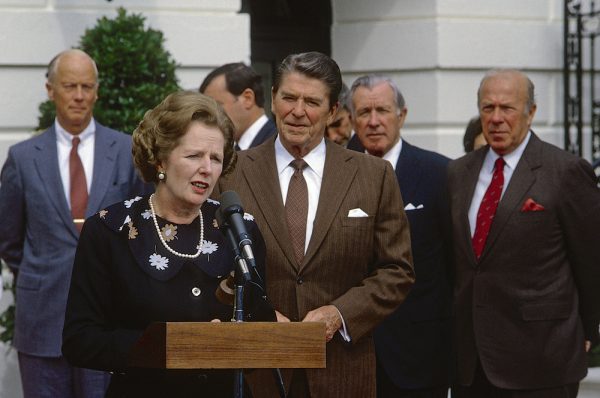Source: Tribune

Photo by mark reinstein/Shutterstock.com
What was required was a kind of ‘shock therapy’ to dramatically reset expectations and encourage people to adjust to a new normal in which the state was smaller, the unions were less powerful and individuals were expected to be responsible for their own wellbeing.
As should be clear from the language used to describe the problem, there was also a moral critique lurking beneath the surface of the neoliberal theory. The state had grown too large on the back of constant Keynesian counter-cyclical spending and was now skewing market outcomes in favour of profligate scroungers rather than hard-working savers. People needed to learn to rely on themselves, rather than the state or, implicitly, each other: the method was economics, the object was to change the soul.
In other words, the neoliberal turn generated a profound shift in the dominant understanding of the relationship between the individual and the collective. ‘Society’—to the extent that it even existed—came to be seen as a totalitarian mass, epitomised by Star Trek’s Borg, often referred to as ‘The Collective’, against which the rugged individuals of The Enterprise battled constantly.
Rather than understanding ourselves as individuals who were reliant upon and responsible for one another, the individual came to be seen as an isolated particle, floating freely in space – occasionally bumping up against other particles but really never becoming embedded in a community, a class, or a society.
This profound shift in the way we understand ourselves and the world was reinforced by the material changes that were introduced in the neoliberal era. Forms of social insurance, into which everyone contributed and most withdrew, were disassembled and replaced with individual insurance pots – from one’s savings account, to one’s private pension, to one’s home. ‘Asset based welfare’, in which one was expected to accumulate assets that could be liquidated in the event of unemployment or illness, is the dominant form of insurance that exists today.
Equally, the shift from public to private spending, and from government to household debt, has also reinforced the narrative of self-reliance over collective responsibility. Consumption is a deeply individualised activity that reinforces our sense of difference from, and superiority or inferiority to, one another – even if our tastes and preferences are profoundly shaped by wider society.
And the experience of indebtedness can be highly isolating – while one can band together with other workers to bargain with a boss, you can’t bargain with your bank (unless you’re extremely wealthy). A debtor is more likely to feel personal shame and anxiety about their situation than they are righteous indignation about the kind of society that would produce a class of people who can’t afford to make ends meet.
The pandemic hit a society that had become more isolated and individualised than ever. In the decade that followed the financial crisis, when it became very obvious that capitalism was rigged in favour of those at the very top, the neoliberal narrative of individual responsibility was brutally reinforced through the ideology of austerity: it is everyone’s personal responsibility to repay their debts (except, of course, the bankers themselves).
The entire edifice of the welfare state was ripped to pieces. The forms of collective insurance that remained—from unemployment to disability support—were dismantled and replaced with utterly degrading forms of ‘workfare’ designed to encourage ‘individual responsibility’. Meanwhile, the rich benefitted from more state support—in the form of bank bailouts and money creation directed towards the financial sector—than ever before.
When Covid-19 hit the UK, it hit a large mass of individuals who had become profoundly isolated from one another. The realisation that we were, in fact, all connected encouraged a revival of mutual aid and collective solidarity, as well as a groundswell of public support for those putting their lives on the line to protect everyone else.
But it wasn’t long before neoliberal logic reasserted itself. The government decided that the best way to deflect blame from its appalling handling of the pandemic (itself the result of the destruction of state capacity which was the legacy of several decades of neoliberal rule) was to shift it onto individuals. And it worked.
The public is now more likely to blame themselves for the spread of the virus than they are the state, which threw money at outsourcing giants that failed utterly to implement an effective system of testing and tracing; which paid people to go to restaurants when it was quite clear the virus was not under control; and which re-opened schools without the capacity to manage the process.
Many on the left look at the polling and wonder how people don’t blame Boris Johnson’s government for what is going on. The individuals who live on this island are described as self-sabotaging drones who are unaware of their own interests. In fact, the unimpeded spread of neoliberal ideology has created a world in which we have no one to blame but ourselves – because we cannot imagine anything beyond ourselves.
Grace Blakeley is a staff writer at Tribune and the host of our weekly podcast A World to Win.
ZNetwork is funded solely through the generosity of its readers.
Donate
